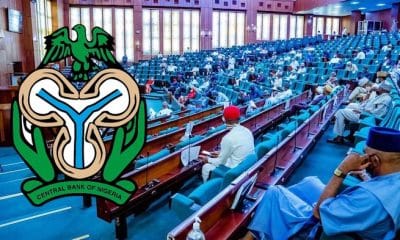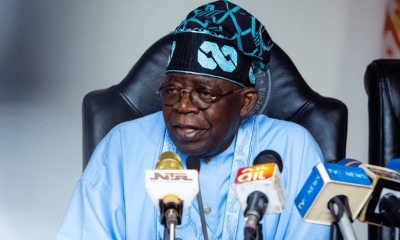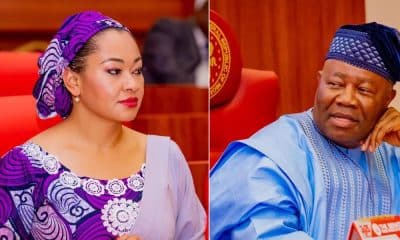Editorial
#ReformIELTSPolicy: Enough Of The Exploitation

As of the time of writing, almost 60,000 petitioners have joined Policy Shapers in seeking an end to the imposition of English Language proficiency test on every Nigerian seeking to study or migrate to the United Kingdom and some advanced countries. In the petition addressed to the Home Secretary of the United Kingdom, Priti Patel, the collective of campaigners argued that the International English Language Testing System (IELTS) should not be required of Nigerians given that their country is predominantly English speaking. They are also uncomfortable with the fact that the test costs over three times the national minimum wage, yet the result is only valid for two years.
While citizens from 18 countries including Antigua and Barbuda, Australia, the Bahamas, Barbados, Dominica, Grenada, Jamaica, Malta, St Kitts and Nevis, Trinidad and Tobago are exempt from writing the test to stand the chance of living or studying in the UK, no Anglophone African country enjoys this privilege despite being former British colonies and belonging to the same Commonwealth!
IELTS, jointly owned by the British Council, IELTS Australia and Cambridge Assessment English, is an English language proficiency test for those seeking to study, migrate or work in Australia, Canada, New Zealand, the United States, and the United Kingdom – countries where English is considered to be the native language. The test usually examines applicants’ ability to listen, read, write and speak in English and is graded on a scale of 1 to 9.
Questions asked in this test are such that an average Nigerian pupil can pass. One of such questions is “Tell me about yourself and your family”. The elementary nature of the questions fuels the notion that the motive is more on fleecing poor nationals of African countries rather than ascertaining their proficiency in the use of the English Language. Imagine subjecting Nigerians who can speak better English than some Briton to no-brainer questions asked in the IELTS. While there are Nigerians raised with English rather than their mother tongue, some UK nationals have Gaelic or Germanic, Irish as their first language.
Nigeria’s Vice President, Prof. Yemi Osinbajo, endorsed the campaign spearheaded by the youth-led open-source platform for policy ideas that address the world’s most pressing challenges, when he said, “I entirely agree that as an English-speaking country, we should be beneficiaries of some concession as opposed to being forced every two years to take the same test (IELTS) especially if one has passed it before. This is something that we should really work on. I will ask the minister of education as well as the minister of youths and sports exactly what is going on about this.” Naija News welcomes his intervention and calls on other leaders to lend their voices to the campaign.
After paying an average of $250 for the IELTS, Nigerian applicants are on the exam day asked questions that can simply be described as a race against time rather than a confirmation of their English language proficiency. If they failed to meet the band score, they will begin the process all over including a fresh registration. Nonetheless, getting the cut-off mark is not a guarantee for being granted a visa or an admission. Worse still, if successful applicants do not come by visa or admission within two years, their result expires forcing them to pay the fee which is regularly reviewed upward. This exploitation of citizens of a country with 92 per cent poverty rate by wealthy nations of the world is unconscionable!
Consider a scenario where a Nigerian applicant takes the IELTS to study in the UK and passes (as difficult as it is to pass), the first IELTS would have expired before they graduate from a bachelor’s degree programme. By the extant system, they would have to prove once again that they are proficient in the English language by sitting for another IELTS, coughing out another US$250. In other words, the UK Home Office is saying they no longer trust if this student knows how to speak, write, listen or read the English language. It’s all for a rip-off as reports have it that from 2016 to 2021, the British Government generated $771.2 million (N319.2 billion) as gross profits made off the backs of prospective students and visa applicants who took the tests. IELTS 2021 financial report ranks Nigeria as among its biggest revenue contributors, based on earnings from the proficiency test’s application fees.
The staggering figures was enough to provoke righteous anger in netizens who in October last year initiated the petition titled ‘Stop asking Nigerians to write IELTS’. This has raised the consciousness of Nigerians into questioning why they should be made to take the English proficiency test despite the fact that English is the country’s official language. The Education First (EF) English Proficiency Index 2021, which has a strong correlation with TOEFL and IELTS, lists Nigeria as one of the 30 most proficient English-speaking countries in the world with 560 Index points. Using the hashtag #ReformIELTSPolicy,campaigners are demanding that if the scheme cannot be entirely scrapped, the cost and validity of the result should be reviewed. Naija News believes that this is the right thing to do given that the DELF & DALF French proficiency tests for non-native speakers cost N16,000($38.55) and N19,000($45.7) with the certificate being valid for life.
The UK Home Office has defended the heavily-criticised policy by explaining that for a country to be on the IELTS Exemption list, 51 per cent of the population must speak English as a first language. There are over 500 languages spoken in Nigeria with most of them going extinct because native speakers have ditched them for the English language. All education in the country is taught in English which is also the language for upward mobility. Since the turn of the century, the fad has been that most Nigerian couples do not only communicate to each other in English but use the language in raising their kids. This explains why there are many Nigerian adults who cannot speak their native dialect. It therefore flies in the face of the reality on ground for the UK Home Office to tell the BBC that they “do not have the required evidence to show that the majority of people in Nigeria speak English as their first language”.
Granted that they “must have evidence that at least 51 per cent of the population speak English as a first language for a country to be included in the Majority English Speaking Country list”, the Home Office must clearly state how it intends to get this evidence so as to justify the continued imposition of the English proficiency test on Nigerians and citizens of Anglophone African countries. While at it, they should review the exorbitant cost of applying for the IELTS and the shelf life of the result. The UK and other owners of IELTS can play the ostrich all they want but cannot run from the fact that the time has come to #ReformIELTSPolicy!
If they insist on discountenancing the signatures which are swelling by the seconds, Africans should refrain from the IELTS. Since most of the applications requiring this proficiency test are for study visas, governments in the continent must invest in education for their citizens to stay back and learn. They will be saving lots of foreign exchange by doing so. Naija News believes that if well harnessed, the outrageous amount which the British Council generates from IELTS in a year can give Africa a world-class university that will compete with the Oxfords of this world. It starts with signing the Policy Shapers’ petition and boycotting IELTS if the promoters failed to do the needful. Enough of the exploitation and neo-colonialism!











